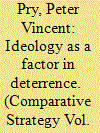| Srl | Item |
| 1 |
ID:
112861


|
|
|
|
|
| Publication |
2012.
|
| Summary/Abstract |
For five decades, the Minuteman ICBM has served the nation well as the most affordable and responsive element of the U.S. nuclear TRIAD. It has secure command and control, high readiness rates, and low operating costs. The existence of the ICBM force provides critical protection for the other legs of the U.S. deterrent. While the ICBM force has thus far survived defense cuts, a follow-on ICBM is needed, design skills are rapidly disappearing, and the solid rocket motor industrial base is shrinking. Maintenance of the nuclear TRIAD is critical, but it is clearly at risk, despite the fact that both the Russians and Chinese are deploying new ICBMs and developing still more modern ones with the intent to deploy them.
|
|
|
|
|
|
|
|
|
|
|
|
|
|
|
|
| 2 |
ID:
112860


|
|
|
|
|
| Publication |
2012.
|
| Summary/Abstract |
History is replete with examples of deterrence failure and war occurring unexpectedly, taking nations by surprise, because of failure to comprehend an adversary's ideology. The modern world has been shaped by failure to comprehend the ideologically driven aggression of Nazi Germany, Imperial Japan, Soviet communism, and Islamic jihadism. The Soviet "war scare" during NATO's nuclear exercise ABLE ARCHER-83 exemplifies how ideology could cause deterrence failure and even nuclear war. Understanding the ideology of potential adversaries must be part of any informed deterrence strategy. U.S. overconfidence in deterrence theory, which is itself an ideological belief system, could contribute to deterrence failure.
|
|
|
|
|
|
|
|
|
|
|
|
|
|
|
|
| 3 |
ID:
112863


|
|
|
|
|
| Publication |
2012.
|
| Summary/Abstract |
When is a two-track policy approach of coercion and conciliation more or less likely to achieve its target objective? The first North Korean nuclear crisis of 1993-94 reveals that a U.S. policy approach combining coercive and conciliatory diplomacy contributed to near-term U.S. policy objectives when conciliation was offered to North Korea in order to signal benign intent. This case also reveals two additional conditions that can hinder a two-track policy from achieving its policy aims: shifting how the objectives of coercive signals and actions are prioritized throughout the course of a crisis, and relying on international institutions and foreign governments for the implementation of a two-track policy.
|
|
|
|
|
|
|
|
|
|
|
|
|
|
|
|
| 4 |
ID:
112862


|
|
|
|
|
| Publication |
2012.
|
| Summary/Abstract |
Policymakers in Washington still lack a methodology for predicting which revolutionary groups now active in the greater Middle East will succeed in their efforts and which will fail. The methodology presented in this article for gauging how these and other revolutionary groups will fare-and for identifying the ingredients for success in revolutionary movements-fills that void. A revolutionary group's success depends on its ability to overpower a regime's defenses, and four metrics can suggest whether such a group will succeed. (1) Do the rebels possess a guerilla army? (2) Does the group maintain a territorial base? (3) Are the rebels at least ostensibly prodemocratic? And, (4) is the regime that the rebels wish to overthrow democratic or authoritarian. And, if it is authoritarian, does the ruling elite come from an ethnic or religious minority?
|
|
|
|
|
|
|
|
|
|
|
|
|
|
|
|